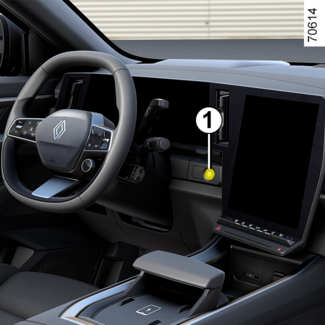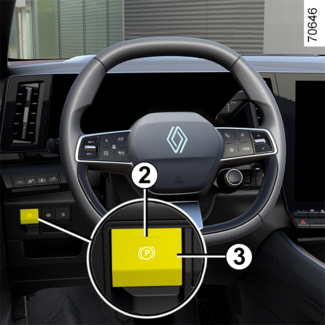Electronic parking brake
Electronic parking brake
Assisted operation
Applying the electronic parking brake

With the vehicle stationary, the electronic parking brake can be used to immobilise the vehicle:
- by pressing the engine start/stop button 1;
or
- when the driver's seat belt is unfastened;
or
- when the driver's door is opened;
or
- when the P position is engaged.
In all other instances, e.g. if the engine stalls, the electronic parking brake is not applied automatically. Manual mode must be used.
For certain country-specific model versions, the assisted brake application function
is not activated. See the information on "Manual operation".

To confirm that the electronic parking brake is applied, the  warning light appears on the instrument panel and the indicator light 2 lights up on the switch3.
warning light appears on the instrument panel and the indicator light 2 lights up on the switch3.
After the engine is switched off, the indicator light 2 goes out a few minutes after the electronic parking brake has been applied and the
 warning light goes out when the vehicle is locked.
warning light goes out when the vehicle is locked.
Note: in some situations (electronic parking brake failure, manual release of the parking
brake, etc.), a beep sounds and the "Apply parking brake" message appears on the instrument panel to indicate that the electronic parking
brake has been released:
- with the engine on: when the driver’s door is opened;
- with the engine off (e.g. when the engine stalls): when a front door is opened.
In this case, pull and release the switch 3 to apply the electronic parking brake.
WARNING
The electronic parking brake can be used to immobilise the vehicle. Before leaving
the vehicle, check that the electronic parking brake is fully applied. Application
of the parking brake is confirmed by the illumination of the indicator light 2 on the switch 3 and the  warning light on the instrument panel until the doors are locked. Depending on the
vehicle, a sticker is located on the upper section of the windscreen to remind you
of this.
warning light on the instrument panel until the doors are locked. Depending on the
vehicle, a sticker is located on the upper section of the windscreen to remind you
of this.
Assisted release of the parking brake
The parking brake is released:
- once the vehicle starts to accelerate;
or
- when shifting from P position.
Manual operation
You can apply the electronic parking brake manually.
Manually applying the electronic parking brake

Pull the switch 3. Warning light 2 and warning light  on the instrument panel light up.
on the instrument panel light up.
WARNING
The electronic parking brake can be used to immobilise the vehicle. Before leaving
the vehicle, check that the electronic parking brake is fully applied. Application
of the parking brake is confirmed by the illumination of the indicator light 2 on the switch 3 and the  warning light on the instrument panel until the doors are locked.
warning light on the instrument panel until the doors are locked.
Depending on the vehicle, a sticker is located on the upper section of the windscreen
to remind you of this.
Manually releasing the electronic parking brake

Press the switch 1 without pressing the pedals to switch the ignition on. Press the brake pedal then
press switch 3: indicator light 2 on the switch and indicator light  displayed on the instrument panel go out.
displayed on the instrument panel go out.
Brief stop

To apply the electronic parking brake manually (when stopping at a red light, stopping
when the engine is running, etc.): pull and release the switch 3. The brake is released as soon as the vehicle is started up again.
Special cases
To park on a slope or while towing a trailer, for example, pull switch 3 for a few seconds to enable maximum braking.
To park, with the electronic parking brake released (if there is a risk of freezing,
for example):
- engage P position: the drive wheels are mechanically locked by the driveshaft;
- stop the engine by pressing the engine Start/Stop button 1;
- unfasten the driver's seat belt;
- open the driver's door;
- manually release the electronic parking brake (please see the paragraph on "Manually releasing the electronic parking brake");
- depending on the vehicle, the parking brake is applied automatically. You will have to release it manually.
WARNING
If no lights or sounds are apparent, this indicates a fault in the instrument panel.
This indicates that it is essential to stop immediately (as soon as traffic conditions
allow). Ensure that the vehicle is correctly immobilised and contact an approved Dealer.
WARNING
Never leave your vehicle without re-engaging P position and switching off the engine. This is because when the vehicle is stationary
with the engine running and a gear engaged, the vehicle may begin to move if you accelerate.
There is a risk of accidents.
Operating faults
- In the event of a fault, the warning light
lights up on the instrument panel accompanied by the "Check parking brake" message and in some cases the warning light
. Contact your approved Dealer straight away.
- In the event of an electronic parking brake fault, the warning light
lights up accompanied by the "Braking system fault" message, a beep, and in some cases the warning light
. This means that you must stop as soon as traffic conditions allow.
Versions with an automatic gearbox
For safety reasons, automatic release is deactivated when the driver’s door is open
or not shut properly and the engine is running (in order to prevent the vehicle from
moving without the driver).
The "Release Parking Brake" message appears on the instrument panel when the driver presses the accelerator
pedal.
WARNING
If the "Electric System Failure" or "Check battery" or "WARNING: Braking System" message appears, you must immobilise the vehicle by engaging the first gear (manual
gearbox), P position (automatic gearbox) or by pulling the switch 3 for approximately 10 seconds.
If the conditions and the slope require it, chock the wheels of the vehicle.
Risk of loss of immobilisation of the vehicle.
Call an approved dealer.